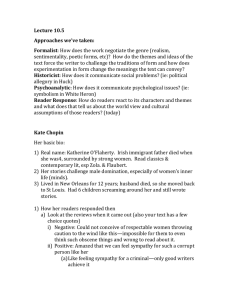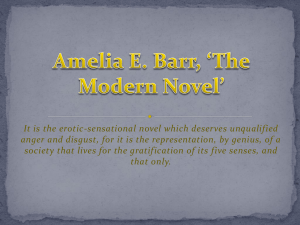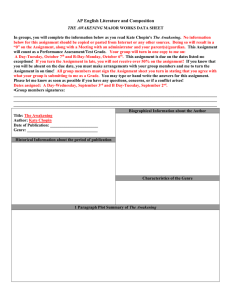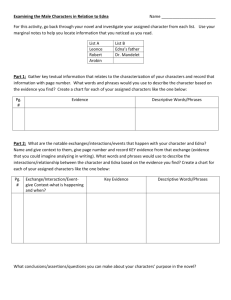Lecture 11: T he Awakening and Feminism
advertisement
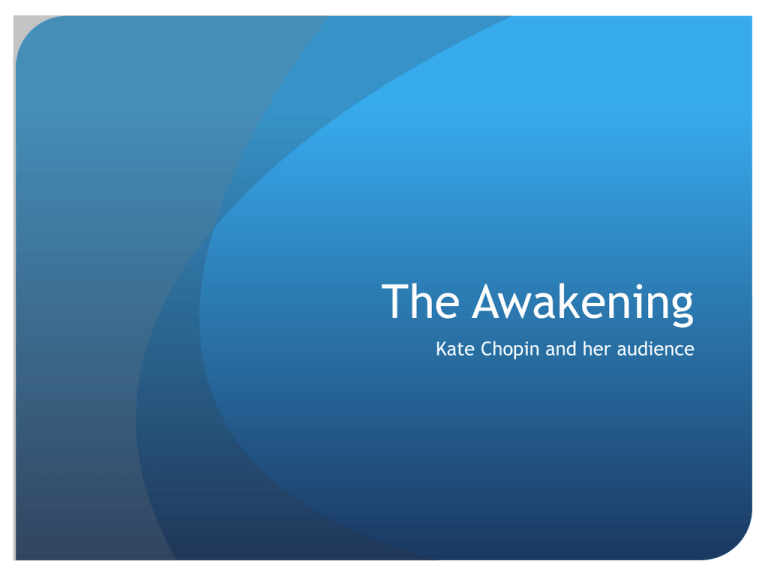
The Awakening Kate Chopin and her audience Basic Bio Real name: Katherine O’Flaherty. Irish immigrant father died when she was four surrounded by strong women Read classics & contemporary lit, esp Zola. & Flaubert Her stories challenge male domination, especially of women’s inner life (their minds) Lived in New Orleans for 12 years husband died, so she moved back to St Louis Had 6 children screaming around her and still wrote stories Reader Response How her readers responded then Look at the reviews when it came out (also your text has a few choice quotes) Negative: Could not conceive of respectable women throwing caution to the wind like this—impossible for them to even think such obscene things and wrong to read about it. Positive: Amazed that we can feel sympathy for such a corrupt person like her Like feeling sympathy for a criminal—only good writers achieve it How we respond now Did you sympathize with her? Did you find her emotions and choices plausible? Do you think she finds herself or is she on the wrong track? What does that say about how we have changed as a culture? What’s Edna looking for? Her first taste is swimming—things change after that. First the music opens her up emotionally (581) Experiences herself as unbounded possibility (583) After that, she stops letting others define her Argues with Robert when he claims to know how she feels Refuses to come in the house when her husband asks her to (585) Begins following every impulse “anchorage snapped” (588) Runs off with Robert for an entire day Sees her infatuation, recognizes it as the same thing as her early crushes, and doesn’t try to moderate or take a longer view (596) Abandoning Convention After her return from the Island, she defies all social expectations Stays away when society women call on Tues as usual (601) Tells M. Ratignolle that motherhood isn’t everything (598) Throws a vase and grinds her foot on her wedding ring (602) Goes out alone with single men (Alicee Arobin) Moves out of her husband’s house Tells Robert “I give myself where I choose” (691) Where is this leading? Does she just want a happier marriage? NO (646) Is she serious as an artist? No—just wants to be doing something Robert? For what—marriage? No (624) Just sex? After sex with Arobin she thinks This Is It (627) Simply follow every hedonistic whim? Not the best way to find meaning in life How does she define freedom? Perhaps the problem is her definition of freedom and individuality Strictly negation—none shall control me, no role, no person Can’t claim a place in the world and try to make it work for her Petty bourgeois morality of her husband is fake But she has no ethical principles of her own besides rejection and sensuality She can’t exert her will toward a vision or goal, so she ends up with nothing, as nothing Suicide is a plausible choice for her as a woman completely outside society and cut off from her children Disappointing ending or productive frustration? For some readers this frustration is productive, makes us want to change things, to give women more options and education For some readers, she is TOO frustrating and they’re angry that she didn’t try harder to find a way to become an authentic self. What do you make of her? Small Group Discussion What does each character represent in terms of the role he/she plays or asks of Edna? Give 2 examples to support your ideas 1. 2. 3. 4. 5. Mr Pontillier Robert Lebrun Adele Ratignolle Mademoiselle Reisz Alicee Arobin Is this a feminist text? Valued by contemporary feminist critics for its portrayal of a 19th century woman’s attempt to reclaim her psychic life and the right to her sexuality Very few of her contemporaries laid the problem out so starkly Willa Cather, Jewett HOWEVER, The Awakening is completely out of step with 19th century feminism and drew a lot of criticism (as we saw) Early 19th Century Feminism Women were involved in Abolitionist cause and Temperance Movements (anti-alcohol) Anti-slavery political groups encouraged women’s full participation—speaking, organizing, etc. Politically active women hated the fact that they couldn’t vote and help change laws by using the system (voting). First convention to be organized by women to work toward equal rights 1848 in Seneca Falls, New York Wanted: Voting rights, property rights (to own and inherit), the right to make contracts, serve on juries and better employment opportunities. Women were paid ½ as much as men in the same job. Some called them “hens that crow” and unnatural women Others supported them Fredrick Douglass was at Seneca Falls and convinced them to keep the voting rights idea instead of backing away from such a radical idea Early gains: New York & Pennsylvania pass laws granting women property rights in 1848 Major Players Elizabeth Cady Stanton, Lucy Stone, and Susan B. Anthony & others Strongly influenced by Quaker thought (pacifist) Some were arrested for trying to vote What they Achieved
